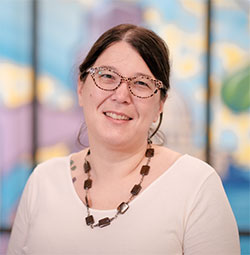

Stella K. Evans, MD, ICF-PCC
Medical director, Spina Bifida Clinic
Medical director, Down Syndrome Clinic
Children's Minnesota - Mpls Campus
Neurosurgery Clinic
1) Why is being an advocate so important to you?
At 17 years of age, I was tired of classroom time and book learning. I was finished with school, or so I thought. I was never going back to formal education! I could change the world with the education I had.
After finishing my senior year, I spent time in service to others in Winnipeg, Manitoba, working with individuals with physical and intellectual disabilities. My time in Canada, and my thoughts about my experiences there made me think that without experience or training, my ability to make a positive difference for others was limited. The next year, I went home and enrolled in college. I wanted to make a larger positive difference.
My commitment to advocacy has persisted over the 30 years since high school graduation. The causes and issues I became involved with varied as my life has changed, but here are a few of the constants that make this a work of the heart:
- Advocacy allows me to work for positive change and the personal agency of those I advocate for.
- Advocacy works against cultural biases that are barriers to equal rights for all.
- It names injustice.
- It provides tools to others that allow them to become empowered and then in turn, to advocate for themselves and for the causes and policies that they care about.
- In short, advocacy is a force multiplier for positive change in individuals and groups.
2) What healthcare related issue(s) have you advocated for over the past year?
As the chair of the Equity and Access and Quality committee for the Minnesota Medical Association, I worked with other committee members on MMA policy proposals on “Prison Labor and Health” and “Access to HIV Prevention and Management Medications”.
Prior to that, as a committee member, I helped to craft proposals on community-based mental health programs, correctional healthcare, community health workers, and insurance coverage for people with undocumented status. These proposals are all now official MMA policy, or on their way for review by the MMA Board of Trustees.
One of my favorite healthcare related advocacy activities was supporting unhoused individuals who used a drop-in center, aiding in coordinating care, including health care and social services.
I am one of several administrators for a large group of MN women physicians on social media.
I offered pro-bono spiritual direction and group coaching sessions to MN women physicians for several years to reduce moral injury and distress, and to teach women physicians the tools they need to better self-advocate.
3) What advice would you offer to others who are interested in advocacy?
Just start. Putting it off means a dream deferred, for you and for the people you want to advocate for. Remember that this is about progress, not about perfection. It isn’t always about big changes and sweeping reforms. Sometimes it is about being the voice that lets others know that they are seen and cared for. Set boundaries so that you are not constantly giving. That way lies frustration and resentment. If doing the work does not lift you up, it is all right to turn your head and your heart to something that fits better.
